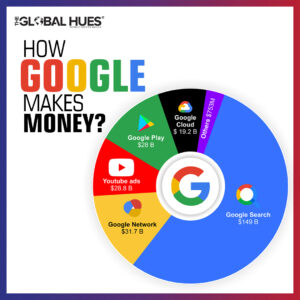We have been using Google and its verified services for years and for free. Whether you want to get the latest news, learn a new language, or play games, it is all possible with just a few clicks without having to spend a single penny. While you continue to do so, does it never strike your mind- If we don’t pay Google, how does Google make money after all?
According to Statista, the 2020 annual revenue of Google reached up to 181.69 billion US dollars. If you think that is insane, just know that these numbers go up every passing year.
Google has numerous ways of generating revenue. Let’s dig deep into how the Google algorithm works and figure out how Google provides us with its best services and makes billions of revenue at the same time.

GOOGLE’S MAIN BUSINESS
Alphabet is one of the most valuable publicly traded businesses in the world, with a market valuation of nearly $1.5 trillion, trailing just Apple, Microsoft, and Amazon. Alphabet is effectively a holding company for Google, which accounts for nearly all of the business’s revenue and profit.
Google has long positioned itself as a technological business, investing in a variety of cutting-edge fields such as internet search, mobile phones, artificial intelligence, self-driving cars, and health technologies. In fact, Google I/O aimed at software professionals, is known for mixing dense technical discussions with far-reaching ideas of the future. However, online advertising is Google’s major business.

Google revenue statistics from 2019- 2021
According to Google Earnings Report 2020
- Alphabet, had a net income of $40.26 billion
- Google’s revenue increased by 12.7%
- Google made $146.92 billion from advertising
- Alphabet had total revenue of $56.89 billion in Q4 2020
GOOGLE ADS AND ADSENSE: BEHIND THE NUMBERS
Aside from private investment and stock sales, Google has a variety of revenue-generating alternatives. Google partners with merchants and advertisers in a number of ways, including Google Pay, Google Ads, Google AdSense, and Google Analytics.
The main way Google generates its revenue is through a pair of advertising services called Ads and AdSense. When you use Google to look for everything from financial information to the weather in your area, you’ll get a list of search results generated by Google’s algorithm. The algorithm tries to deliver the most relevant results for your query, and you may see similar suggested pages from a Google Ads advertiser alongside these results.
Advertisers must outbid each other to get the top spot in Google advertisements. Higher bids rise to the top of the list, while low bids may go unnoticed.
-
Ads
With the help of Advertising, advertisers submit ads to Google that comprise a list of keywords related to a product, service, or company. The ad shows in a sidebar on the SERP (Search Engine Result Page) when a Google user searches the Web using one or more of those keywords. When a user clicks on the ad and is directed to the advertiser’s website, the advertiser pays Google.
For highly competitive target keywords such as insurance, loans, and other financial services, a click could be worth anything from a few cents to over $50.

-
AdSense
Google’s AdSense program allows non-Google websites to embed Google display advertising on their pages in addition to search advertising. AdSense advertisements work in the same way as Google’s onsite ads, except they appear on Google-approved sites all over the Internet and a webmaster can choose to integrate ads on their site.
The site’s content is thoroughly analyzed by Google’s spiders. Then Google picks advertisements with keywords that are related to the webmaster’s site. Google advertising can be customized in terms of type and location by webmasters. The site receives a share of the ad revenue every time someone clicks on an ad on the site and Google gets the rest.

ROLE OF GOOGLE ANALYTICS IN ADVERTISING
Google Analytics is a great tool for tracking website traffic and gaining a better understanding of who your users are and what they’re looking for on your site. Besides, it also provides an in-depth account of a business’s online performance.
Data is an important cornerstone of any digital marketing strategy, and having the appropriate tools in place before you start marketing ensures you achieve the outcomes you desire. Google Analytics provides you with that and much more.
Here are some of the other benefits that come from Google Analytics in digital marketing and advertising:
- Offline to Online Tracking
- Data Reports And Customization
- Online Advertising With Marketing Analytics Improvement
- Search Engine Optimization And Content Marketing Improvement
- Google Analytics Conversion Tracking
- Finding The Right Target Audience
- Understanding the user behavior

FINAL WORDS
One of the main channels of profit for Google has been Google Ads- the advertising feature that used to be called Google AdWords. And it makes sense because advertising on the world’s largest search engine platform is extremely important for any business.
It ensures that a large number of people see what you’re trying to sell, and you can literally filter out the people who don’t want to view your ads based on a variety of parameters



